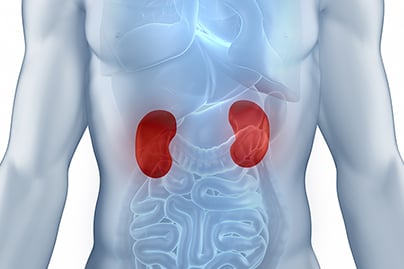Recipes
Kidney stones are a common medical complaint. They occur when minerals and salts that are normally found in the urine accumulate and crystalize, forming stones. Poor nutrition and lifestyle choices play a large role in the development of kidney stones. A high nutrient, plant-based diet is key to preventing stone formation.

According to the National Health and Nutrition Examination Survey, the prevalence of kidney stones was 8.8%, affecting 1 in 11 people in the U.S.1 As developing countries adopt a more Western diet style (the Standard American Diet), their kidney stones rates continue to increase to match those of the U.S. There are five main types of kidney stones: calcium oxalate, calcium phosphate, uric acid, struvite, and cysteine. Eighty percent are calcium oxalate stones.
Many patients with kidney stones do not experience any symptoms; however, if large enough, the stones can cause severe flank and abdominal pain, pain when urinating, blood in the urine, nausea, vomiting, and urinary frequency or urgency. If infection is present, then chills and fever can occur. Some patients require hospitalization, pain control, antibiotics, and extraction. If kidney stones are large enough to cause obstruction, then acute renal failure can occur.
The risk factors for kidney stones include:
ONLINE: All members of DrFuhrman.com can search the Ask the Doctor archives for discussions on this topic. Platinum and Diamond members can connect with Dr. Fuhrman by posting questions in the forum. Not a member? Join now.
IN PERSON: Book a stay at Dr. Fuhrman’s Eat to Live Retreat in Southern California. With options ranging from one, two and three months (and sometimes longer) you will be under Dr. Fuhrman’s direct medical supervision as you hit the “reset” button on your health. For more information: (949) 432-6295 or info@ETLRetreat.com.
EVENTS: Join Dr. Fuhrman for an online boot camp, detox or other event. During these immersive online events, you’ll attend zoom lectures, follow a special meal plan, and have access to a special, live Q&A session with Dr. Fuhrman. Learn more about events.
The following are sample questions from the Ask the Doctor Community Platinum and higher members can post their health questions directly to Dr. Fuhrman. (All members can browse questions and answers.)
My husband has been dealing with very bad cases of kidney stones his entire life. Sometimes the kidney stones pass, but there have been four instances in a three-year span where he had to go in for surgery. After a 24-hour urine test, the doctor said he had high oxalate levels in his urine and gave us a list of things to stop eating, which included practically everything healthy and recommended on a Nutritarian diet (spinach, berries, etc.) and told him to replace with junk like white bread, white rice, etc.
I don’t know what else to do to help rid him of these constant kidney stones. My husband eats a Nutritarian diet about 90% of the time and still eats meat and some junk 10% of the time.
Your husband may be in that rare category where they may still have a tendency to form kidney stones, but the diet and perhaps supplements may make it much better over time, so he should still try. Research suggests that those on a vegetarian diet actually have a lower risk of forming stones regardless of the oxalate in the diet, although reducing the oxalate richest foods should still be part of his plan. Have him restrict or eliminate spinach, chard, parsley, and maybe beets, but all the other foods that have relatively moderate amounts should not be avoided because that limits the diet too much and there is only a little benefit from restricting oxalate to that low level anyway. Review my supplemental recommendations to further reduce oxalate stones from forming here: http://forums.drfuhrman.com/showthread.php?t=40911&highlight=kidney